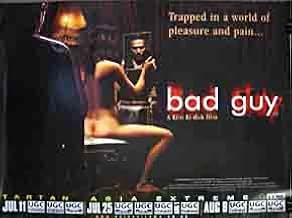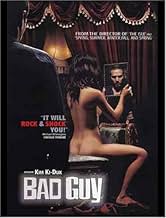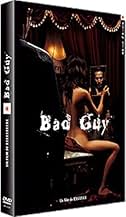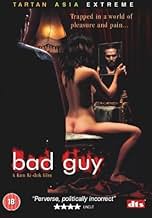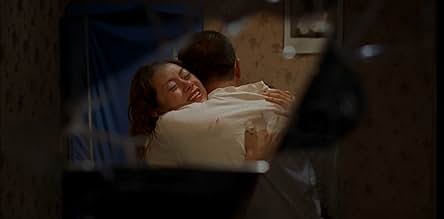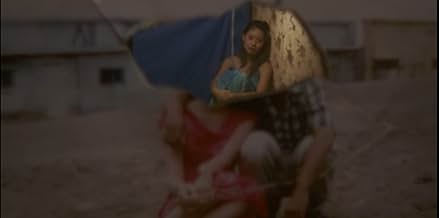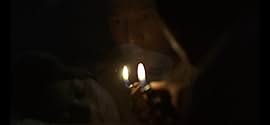Nappeun namja
- 2001
- Tous publics
- 1h 40min
NOTE IMDb
6,6/10
11 k
MA NOTE
Ajouter une intrigue dans votre langueAn unfeeling gangster seeks to ruin the life of a young girl who rejected him. He forces her into prostitution and spies on her regularly, then he soon begins to fall for her.An unfeeling gangster seeks to ruin the life of a young girl who rejected him. He forces her into prostitution and spies on her regularly, then he soon begins to fall for her.An unfeeling gangster seeks to ruin the life of a young girl who rejected him. He forces her into prostitution and spies on her regularly, then he soon begins to fall for her.
- Réalisation
- Scénario
- Casting principal
- Récompenses
- 4 victoires et 3 nominations au total
Kim Yun-tae
- Yun-tae
- (as Yun-tae Kim)
Kim Jeong-yeong
- Eun-hye
- (as Kim Jung-young)
Min Nam-koong
- Hyun-su
- (as Gung-Min Nam)
Avis à la une
Kim Ki-duk's seventh movie could have been so much more. Romantising forced prostitution is not a very sensible decision. Lets face it the film is meant to be uncomfortable viewing, but by the end it was to much, and the final message put forth seemed a grave mistake - if you force sex on a girl enough she will eventually love you and stay with you forever even if she is still forced to sell herself (now thats shocking)!! As for the film making, in general it was disappointing, a horrible shaky POV shot to show a character's drunkenness - that is lazy film-making, and the use of bad music, added to the blatant romanticism of a serious issue. Some valid attempts made at portraying the nasty realism of the red light district were again undercut by cheesy romance! Although there is no doubt that Kim Ki-duk is a talented filmmaker (see 'Spring, Summer' for a fine example), this film showcases little of this.
With the work of South Korean filmmaker Kim Ki-Duk, the viewer has to accept some very fundamental "flaws" that inherently seem to be a part of his work in a practical sense. The production values are always cheap, the soundtrack music is always tacky, the acting is never more than at the most basic level, there are continuity errors... in a word, his films always seem low budget and as if everything were shot in one take. Also he has almost an insistence on breaching realism and lapsing into his own vague allegory. His characters never follow any kind of real internal logic, but rather act according to the scenario he conceives. All of these factors amount to the reason I don't think I will ever be able to consider any of his films true masterpieces.
That said, in return for accepting these inherent flaws, the viewer is rewarded with a candid, unadulterated look into the creative mind of a very interesting person. Kim Ki-Duk's vision is relentlessly idiosyncratic, but very consistent and pure. Watching his films, you gain direct access into his thoughts. This is not film-making by committee, this is "auteurism" in the truest sense. That in and of itself is such a rarity that his films are worth seeing for this reason alone. And this film, "Bad Guy", is probably the purest, most definitive example of Kim Ki-Duk's vision. All the preoccupations that manifest in his other work are here: The mute, inexpressive protagonist, the seeming obsession with prostitution and the degradation of women in general, and also the director's tendency to eventually lead his characters into an incomprehensible fantasy world. Whether or not the viewer is willing to accept these illogical flights of fancy is purely a matter of taste, but personally i find his work fascinating solely because it is so stubbornly idiosyncratic and fueled by a remarkably pure sense of creative expression.
That said, in return for accepting these inherent flaws, the viewer is rewarded with a candid, unadulterated look into the creative mind of a very interesting person. Kim Ki-Duk's vision is relentlessly idiosyncratic, but very consistent and pure. Watching his films, you gain direct access into his thoughts. This is not film-making by committee, this is "auteurism" in the truest sense. That in and of itself is such a rarity that his films are worth seeing for this reason alone. And this film, "Bad Guy", is probably the purest, most definitive example of Kim Ki-Duk's vision. All the preoccupations that manifest in his other work are here: The mute, inexpressive protagonist, the seeming obsession with prostitution and the degradation of women in general, and also the director's tendency to eventually lead his characters into an incomprehensible fantasy world. Whether or not the viewer is willing to accept these illogical flights of fancy is purely a matter of taste, but personally i find his work fascinating solely because it is so stubbornly idiosyncratic and fueled by a remarkably pure sense of creative expression.
"Bad Guy (Nabbeun namja)" is an earlier film of Ki-duk Kim that is probably being released now in the U.S. due to the success of "Spring, Summer, Fall, Winter... and Spring (Bom yeoreum gaeul gyeoul geurigo bom)," but fans of that visually entrancing parable should be warned how very different this exploration of the depths of human nature is.
The style has some similarity in that there is no exposition and we have to connect images that tell a tale of two very different people over time. Context is everything as voyeurism keeps repeating along a sexual spectrum of men and women together -- to romantic or erotic or degrading or lustful or violent, full of obsession or love or hate or longing or disgust, whether in prostitution, a relationship, or rape.
A key context is emotions and degrees, whether by the man or woman, or mutual, or drained of feeling such that I'm not sure love has any meaning in this film. There's a recurring use of Egon Schiele's erotic art to make some kind of comparative point about a continuum of sexual images and their effect on the viewer.
The titular character is reminiscent of Quasimodo of "The Hunchback of Notre Dame" fixating on Esmeralda if he were a psychopathic pimp in, I presume, Seoul's lurid red light district and played by the charismatic Jae-hyeon Jo, like an apolitical "Romper Stomper." I did get a little lost where he fit into the hierarchy of the yakuza-like gangster organization that controls the district, how much authority he has, and who was on top of whom to interpret their obsessions. Some of the encounters we see are presumably his limited fantasies as he miraculously recovers from various violently noble efforts to protect and reach out to the object of his affection that reminded me of the ambiguous ending of Jane Campion's "The Piano."
The film explores some of the same territory as the work of Catherine Breillat, but the context seems uneasily different when I'm the only woman in the theater and the director is male, perhaps because the central woman is always an object, even as she pitifully adapts to her various degradations, and even resists being freed from them. All the women in the film treat each other like the men treat them.
The style has some similarity in that there is no exposition and we have to connect images that tell a tale of two very different people over time. Context is everything as voyeurism keeps repeating along a sexual spectrum of men and women together -- to romantic or erotic or degrading or lustful or violent, full of obsession or love or hate or longing or disgust, whether in prostitution, a relationship, or rape.
A key context is emotions and degrees, whether by the man or woman, or mutual, or drained of feeling such that I'm not sure love has any meaning in this film. There's a recurring use of Egon Schiele's erotic art to make some kind of comparative point about a continuum of sexual images and their effect on the viewer.
The titular character is reminiscent of Quasimodo of "The Hunchback of Notre Dame" fixating on Esmeralda if he were a psychopathic pimp in, I presume, Seoul's lurid red light district and played by the charismatic Jae-hyeon Jo, like an apolitical "Romper Stomper." I did get a little lost where he fit into the hierarchy of the yakuza-like gangster organization that controls the district, how much authority he has, and who was on top of whom to interpret their obsessions. Some of the encounters we see are presumably his limited fantasies as he miraculously recovers from various violently noble efforts to protect and reach out to the object of his affection that reminded me of the ambiguous ending of Jane Campion's "The Piano."
The film explores some of the same territory as the work of Catherine Breillat, but the context seems uneasily different when I'm the only woman in the theater and the director is male, perhaps because the central woman is always an object, even as she pitifully adapts to her various degradations, and even resists being freed from them. All the women in the film treat each other like the men treat them.
This is not the best of movies, but I rank it high because it did it for me. Though the characters are not really presented to the viewer, they are developed through the movie by showing their actions. The plot is not really important here, and people that cling to whatever feminist or political agendas when discussing a movie are wasting everybody's time. It reminds me of an old Italian movie, I can't remember the name or actors because I've seen it when I was a kid, with a mafia boss that falls in love with a woman, kidnaps her but wants to charms her, rather that rape her. This is also about a generally violent man who's attention is captured by a beautiful girl and he also wants access to her soul, rather than her body.
The movie is full of contrasts and paradoxes, but what sets it apart is the atmosphere (I had my heart pumping a good part of the movie, without it being an action movie or anything) and the subtle way it reveals the deep needs of every character.
Its bad part, though, is that close to the end you keep expecting the movie to end and it doesn't. The slow pace of the movie doesn't help either, so a feeling of "is it over yet?" can easily set in.
I liked it, I recommend it to people who have the mood to see a psychological Asian movie about gangsters, prostitutes and the power of love.
The movie is full of contrasts and paradoxes, but what sets it apart is the atmosphere (I had my heart pumping a good part of the movie, without it being an action movie or anything) and the subtle way it reveals the deep needs of every character.
Its bad part, though, is that close to the end you keep expecting the movie to end and it doesn't. The slow pace of the movie doesn't help either, so a feeling of "is it over yet?" can easily set in.
I liked it, I recommend it to people who have the mood to see a psychological Asian movie about gangsters, prostitutes and the power of love.
Kim Ki-duk's "Bad Guy" brings the viewer to a world of violence, jealousy, unfulfilled desires and silly mistakes that gets undone under repetition, tonal shifts and a running time that goes a little bit for too long.
Sun-hwa is waiting for her boyfriend when she attracts the attention of Han-ki. Han-ki, who doesn't seem to care too much for others' opinions, decides to kiss her in front of everyone, including the boyfriend. Some soldiers that are passing by reward him with a beating. But the story of Sun-hwa and Han-ki is not over, and when she makes a mistake, Sun-hwa falls into the hands of Han-ki and his group, which will force her into a life of prostitution.
If you have seen any of Kim Ki-duk's movies you will already know his love for silences, the problems of communication, the gender relationships (including the more carnal side) in South Korea and other stuff. And "Bad Guy" has a little bit of everything. Sadly, all these interesting observations fall into a plot which suffers from bad pace, little originality and two characters who are little developed (you can see their arc development from moment one). Which is a pity, because the acting is good (even if Han-ki's constant mutism is overdone).
As a look into the darkness we all have within ourselves, it is interesting enough. But it cannot overcome its shortcomings, Kim Ki- duk overplaying his cards this time.
Sun-hwa is waiting for her boyfriend when she attracts the attention of Han-ki. Han-ki, who doesn't seem to care too much for others' opinions, decides to kiss her in front of everyone, including the boyfriend. Some soldiers that are passing by reward him with a beating. But the story of Sun-hwa and Han-ki is not over, and when she makes a mistake, Sun-hwa falls into the hands of Han-ki and his group, which will force her into a life of prostitution.
If you have seen any of Kim Ki-duk's movies you will already know his love for silences, the problems of communication, the gender relationships (including the more carnal side) in South Korea and other stuff. And "Bad Guy" has a little bit of everything. Sadly, all these interesting observations fall into a plot which suffers from bad pace, little originality and two characters who are little developed (you can see their arc development from moment one). Which is a pity, because the acting is good (even if Han-ki's constant mutism is overdone).
As a look into the darkness we all have within ourselves, it is interesting enough. But it cannot overcome its shortcomings, Kim Ki- duk overplaying his cards this time.
Le saviez-vous
- AnecdotesDirector Trademark (Kim Ki-duk): Han-ki remains a mute character for much of the film.
- Crédits fousThe last shot shows a truck with an orange cover going down a road in the distance. When the end credits begin, the truck becomes a small orange square that remains on the screen for the entire duration of the end credits.
- ConnexionsReferenced in Arirang (2011)
- Bandes originalesI tuoi fiori
Written and Performed by Etta Scollo
Meilleurs choix
Connectez-vous pour évaluer et suivre la liste de favoris afin de recevoir des recommandations personnalisées
- How long is Bad Guy?Alimenté par Alexa
Détails
- Date de sortie
- Pays d’origine
- Site officiel
- Langue
- Aussi connu sous le nom de
- Bad Guy
- Lieux de tournage
- Sociétés de production
- Voir plus de crédits d'entreprise sur IMDbPro
Box-office
- Montant brut mondial
- 62 100 $US
- Durée1 heure 40 minutes
- Couleur
- Mixage
- Rapport de forme
- 1.85 : 1
Contribuer à cette page
Suggérer une modification ou ajouter du contenu manquant



